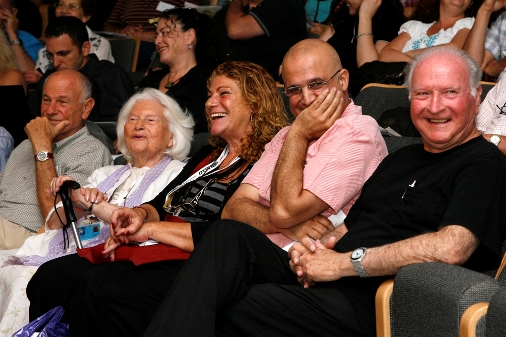“You shine your shoes, why not your face?” a woman cheerfully defends the validity of facials in a short film made on a kibbutz in the 1960s, a time when the kibbutz was in its heyday and any activity was scrutinized according to values of equality, simplicity and the benefit of the collective. Reading these words is nothing like seeing the film itself; the unmediated experience requires no explanation: funny, informative and poignant, it conveys the mood of the time and essential qualities of the kibbutz movement in a matter of moments.
The Forum for the Preservation of the Audio Visual Memory in Israel is dedicated to ensuring the preservation and accessibility of such audio-visual materials – many of which have already been lost. It is a labor of love that has been carried out without fanfare, as over the years people have collected, preserved and catalogued material in archives (private and public collections, many without reliable funding). Established in 2005, the Forum has worked to increase public awareness and promote legislation to save these resources. “Between National and Personal Documentation,” the sixth annual conference of the Forum, moderated by filmmaker Danny Muggia, and held at the Jerusalem Van Leer Institute on Friday, July 9, 2010 as part of the 27th Jerusalem Film Festival, was both a celebration and a rallying cry for action.
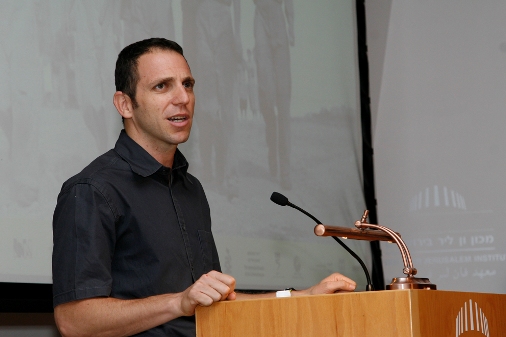
Celebrating the 50th anniversary of the Israel Film Archive of the Jerusalem Cinematheque and taking a look at 100 years of the Kibbutz in art and documentation, with screenings of rare archival footage, it was also an occasion to note the progress that has been made and call attention to the task that lies ahead. Opening remarks by Zach Granit, Head of Culture and Art Administration, Ministry of Culture and Sport, included mention of the newly launched TAMAR Program (Hebrew acronym for Tashtiyot Moreshet Leumit – Foundations of National Heritage) which seeks to bring about a “revolution” (from Cabinet Secretary Zvi Hauser’s letter to Prime Minister Binyamin Netanyahu of 17.2.10) in the approach to the preservation of Israeli national heritage.
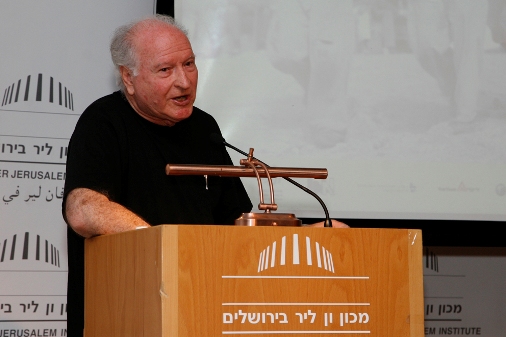
Yishai Amrami, Chairman of the Forum, was pleased to announce, “There is a breakthrough – we have succeeded in placing a new law on the agenda of the Knesset.” The bill proposing legislation, click here for Hebrew text, was presented by Ofir Akonis of the Likud Party, Chairman of the Economic Affairs Committee, to the Knesset on July 21, 2010, and co-signed by Zevulun Orlev, of Habayit Hayehudi – New National Religious Party, and Chairman of the Education and Culture Committee; Robert Ilatov, Chairman of the Yisrael Beteinu Party; Ronnie Bar-On, of the Kadima Party; Nitzan Horowitz, of the New Movement – Meretz Party and Chairman of the Lobby for Culture; and Einat Wilf of the Israel Labor Party.
Emphasizing that this is just a proposal, Amrami said, “We call the public to be our partners in this endeavor in the process of creating a law.”
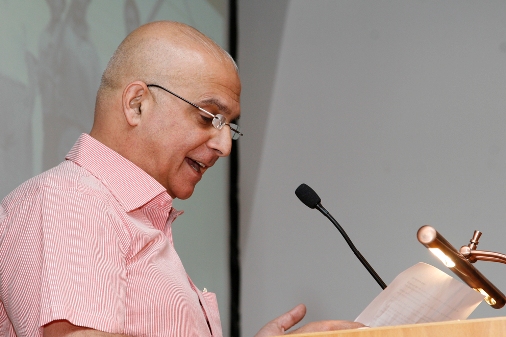
Yigal Mulad-Hayo, Co-Director of the Jerusalem Cinematheque expressed the essence of the conference saying, “We commemorate wars with memorial ceremonies and monuments, but the life that takes place between them we remember thanks to people like Wim and Lia Van Leer. As Israelis we should have been more aware of the importance of preservation and making materials accessible, sadly, this was not the case… Did you ever wonder what Trumpeldor looked like? What kind of laundry detergent did people use? What was every day life like in the Jewish communities destroyed in the Holocaust?”

Yigal Ravid, whose show “Kach Haya” [loosely translated from Hebrew – That’s the Way it Was] airs every Friday at 18:00on Channel 1 of the Israeli Broadcasting Authority (IBA), took the conference on a visual journey of the past from scenes of daily life in Jerusalem filmed by the Lumiere Brothers in 1896, rare footage of Zeev Jabotinsky in 1928 discovered in the Warsaw National Archive, to the first espresso bar in Tel Aviv (on Dizengof in 1951), and actress Gila Amagor in an ad for Elite Coffee.
Unlike many conferences which tend to stray in the direction of tedium, the sessions were fascinating and the atmosphere was warm, lively and spontaneous. A clip from the 1950 film “Hafuga” which advertises itself as “speaking and singing in Hebrew” featured an Israeli soldier Miriam, kidnapped by two Arabs, calling out – as Ravid pointed out, ‘not very convincingly’ – “Hatzilu! Hatzilu!” [Hebrew: save me!]. This not only prompted chuckles from the audience, but historical notes from filmmaker Yaakov Gross that “the actress was called Eti Hasimha and everyone in her class at law school called her Eti Hatzilu.” Yet the photograph of the site where the film footage was found – a trash heap in an alley where it was recovered and restored from inside an old projector – was eloquent testimony to the importance and urgency of the Forum’s mission.
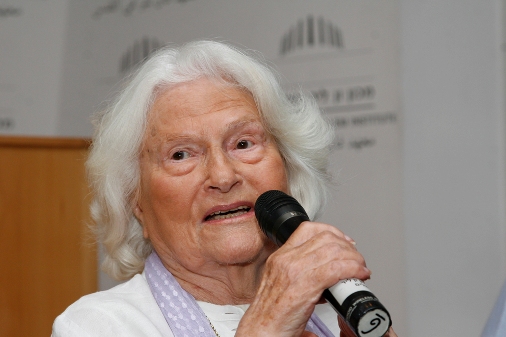
The tribute to Lia Van Leer was a joyous part of the conference, inspiring in its reminder of what the imagination, drive and wisdom of one person can accomplish. In a clip from Dalia Karpel’s documentary (in progress), Ms. Van Leer says, “I began to collect films that I kept in my home in the guest room under the bed,” and that is where the Israel Film Archive began.

The focus on the kibbutz included several different perspectives. Dr. Gila Flam of the National Library of Israel’s Music and Sound Archives Collection presented the kibbutz’s unique approach to celebrating Jewish holidays, defining their relationship to tradition through creating their own ceremonies in song. Dr. Ariel Feldstein, Academic Head of the Sapir College, recalled the influence of the National Center for Jewish Film while conducting his post-doctoral research at Brandeiss University in 2000, saying: “I saw history in front of my eyes. The written word does not bring the material to life. Visual material is important in historical research.” Feldstein discussed the image of the pioneer and the kibbutz in Israeli cinema of the 1930s. He said that although cinema was employed as a “vehicle of institutional propaganda,” examination of the films reveals that in fact, the cinema of the time did “give expression to doubt,” and accompanied his talk with interesting footage that expressed the different aspects of Israeli cinema of that era.
Guy Raz presented “Photographers 1924 – 1974 Court Photographers.” Although on one hand the kibbutz had a sense of the unique historic importance of the social experiment they were conducting, at the same time, the documenters of this process from within – the kibbutz member photographers were often unappreciated and worked under the constraint of inadequate time allotment and difficult conditions. Raz showed photographs of Yaakov Ben Dov, Hanan Bahir (an exhibit of Bahir’s work, curated by Raz was presented in the foyer in conjunction with the conference), Dalia Amotz and others. Raz noted the difference between their intimate perspective as seen in photographs such as Bahir’s photo of two people sitting on a bench, one reading a newspaper while the other dozes, compared to the heroic pioneer stance captured by Zoltan Kluger (selected as the image to represent the conference) who was sent to photograph the 20th anniversary of Kibbutz Geva. David Amitai of the Yad Yaari Research and Documentation Center presented the dire conditions of existing kibbutz archives, emphasizing the need for immediate action.
The concluding session of the conference was bitter-sweet: Director and researcher Professor Judd Ne’eman discussed the work of filmmaker Nadav Levitan, receipient of the 2010 Lifetime Achievement Award of the Forum and the Jerusalem International Film Festival. Levitan passed away in January 2010, and the award was accepted by his wife, singer Chava Alberstein. Levitan’s kibbutz trilogy – ‘An Intimate Story’ 1981, ‘Stalin’s Disciples’ 1987 (screened at the Cannes Film Festival – Un Certain Regard), and ‘No Names on the Doors’ 1997, provide an intimate, yet critical view of kibbutz culture as it evolved over the years.
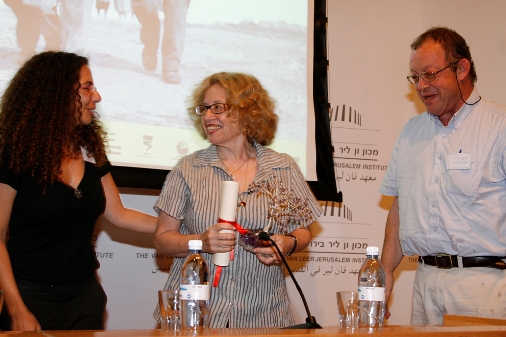
In accepting the award, Chava Alberstein (who met Levitan when she starred in his first kibbutz film – ‘An Intimate Story’) said that “Nadav would have been happy to receive this award…He did not reap much satisfaction, but was happy that he was able to make his kibbutz movies. He wanted to give special thanks to Judd Ne’eman, but did not have time to do it personally.”
In addition to the annual conference, the Forum for the Preservation of the Audio Visual Memory in Israel presents an annual award at the Jerusalem International Film Festival. This year’s award was given to Yael Hersonski’s ‘A Film Unfinished.’
Memory is a powerful force, one that is deeply felt and experienced in Israel, where memory frames our identity, shapes our decisions – both personal and political, and influences our daily lives in countless ways. Yet it is also fragile, evasive, and mutable. The documents of memory – texts and images, bring to life the transient moments of our collective and individual history, yet are themselves painfully vulnerable to the effects of time.
The sixth annual conference of the Forum for the Preservation of Audio-Visual Memory in Israel was made possible through the efforts of many people:
Editor and director, Liat Benhabib
Archival research and directing of transitional segments, Billy Segal
Organization of the 50th anniversary Israel Film Archive session: Israel Film Archive Jerusalem Cinemathque, Yaakov Gross, Avigail Green, Ilil Weiser, Yigal Mulad-Hayo, Michal Mendelbaum, Sasha Kleinman, Yigal Ravid, Meir Russo
Production: Jonathan Nadav
Conference staff: Liat Benhabib, Anat Zeltzer, Billy Segal
Production coordinator: Yael Factor
Technical operation: Nir Bar-Av
Graphic design: Studio Z
Video editing: Danit Uziel, United King Films
AYELET DEKEL

